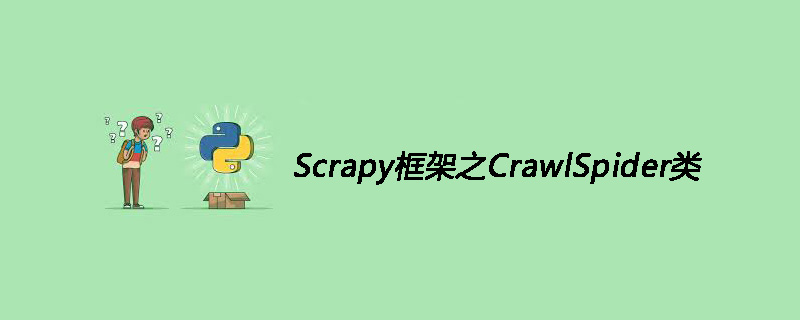
CrawlSpider类
通过下面的命令可以快速创建 CrawlSpider模板 的代码:
scrapy genspider -t crawl tencent tencent.com
CrawSpider是Spider的派生类,Spider类的设计原则是只爬取start_url列表中的网页,而CrawlSpider类定义了一些规则(rule)来提供跟进link的方便的机制,从爬取的网页中获取link并继续爬取的工作更适合。
CrawSpider源码详细解析
class CrawlSpider(Spider):
rules = ()
def __init__(self, *a, **kw):
super(CrawlSpider, self).__init__(*a, **kw)
self._compile_rules()
#首先调用parse()来处理start_urls中返回的response对象
#parse()则将这些response对象传递给了_parse_response()函数处理,并设置回调函数为parse_start_url()
#设置了跟进标志位True
#parse将返回item和跟进了的Request对象
def parse(self, response):
return self._parse_response(response, self.parse_start_url, cb_kwargs={}, follow=True)
#处理start_url中返回的response,需要重写
def parse_start_url(self, response):
return []
def process_results(self, response, results):
return results
#从response中抽取符合任一用户定义'规则'的链接,并构造成Resquest对象返回
def _requests_to_follow(self, response):
if not isinstance(response, HtmlResponse):
return
seen = set()
#抽取之内的所有链接,只要通过任意一个'规则',即表示合法
for n, rule in enumerate(self._rules):
links = [l for l in rule.link_extractor.extract_links(response) if l not in seen]
#使用用户指定的process_links处理每个连接
if links and rule.process_links:
links = rule.process_links(links)
#将链接加入seen集合,为每个链接生成Request对象,并设置回调函数为_repsonse_downloaded()
for link in links:
seen.add(link)
#构造Request对象,并将Rule规则中定义的回调函数作为这个Request对象的回调函数
r = Request(url=link.url, callback=self._response_downloaded)
r.meta.update(rule=n, link_text=link.text)
#对每个Request调用process_request()函数。该函数默认为indentify,即不做任何处理,直接返回该Request.
yield rule.process_request(r)
#处理通过rule提取出的连接,并返回item以及request
def _response_downloaded(self, response):
rule = self._rules[response.meta['rule']]
return self._parse_response(response, rule.callback, rule.cb_kwargs, rule.follow)
#解析response对象,会用callback解析处理他,并返回request或Item对象
def _parse_response(self, response, callback, cb_kwargs, follow=True):
#首先判断是否设置了回调函数。(该回调函数可能是rule中的解析函数,也可能是 parse_start_url函数)
#如果设置了回调函数(parse_start_url()),那么首先用parse_start_url()处理response对象,
#然后再交给process_results处理。返回cb_res的一个列表
if callback:
#如果是parse调用的,则会解析成Request对象
#如果是rule callback,则会解析成Item
cb_res = callback(response, **cb_kwargs) or ()
cb_res = self.process_results(response, cb_res)
for requests_or_item in iterate_spider_output(cb_res):
yield requests_or_item
#如果需要跟进,那么使用定义的Rule规则提取并返回这些Request对象
if follow and self._follow_links:
#返回每个Request对象
for request_or_item in self._requests_to_follow(response):
yield request_or_item
def _compile_rules(self):
def get_method(method):
if callable(method):
return method
elif isinstance(method, basestring):
return getattr(self, method, None)
self._rules = [copy.copy(r) for r in self.rules]
for rule in self._rules:
rule.callback = get_method(rule.callback)
rule.process_links = get_method(rule.process_links)
rule.process_request = get_method(rule.process_request)
def set_crawler(self, crawler):
super(CrawlSpider, self).set_crawler(crawler)
self._follow_links = crawler.settings.getbool('CRAWLSPIDER_FOLLOW_LINKS', True)
CrawlSpider继承于Spider类,除了继承过来的属性外(name、allow_domains),还提供了新的属性和方法:
LinkExtractors
Link Extractors 的目的很简单: 提取链接。
每个LinkExtractor有唯一的公共方法是 extract_links(),它接收一个 Response 对象,并返回一个 scrapy.link.Link 对象。
Link Extractors要实例化一次,并且 extract_links 方法会根据不同的 response 调用多次提取链接。
class scrapy.linkextractors.LinkExtractor(
allow = (),
deny = (),
allow_domains = (),
deny_domains = (),
deny_extensions = None,
restrict_xpaths = (),
tags = ('a','area'),
attrs = ('href'),
canonicalize = True,
unique = True,
process_value = None
)
主要参数:
allow:满足括号中“正则表达式”的值会被提取,如果为空,则全部匹配。
deny:与这个正则表达式(或正则表达式列表)不匹配的URL一定不提取。
allow_domains:会被提取的链接的domains。
deny_domains:一定不会被提取链接的domains。
restrict_xpaths:使用xpath表达式,和allow共同作用过滤链接
rules
在rules中包含一个或多个Rule对象,每个Rule对爬取网站的动作定义了特定操作。如果多个rule匹配了相同的链接,则根据规则在本集合中被定义的顺序,第一个会被使用。
class scrapy.spiders.Rule( link_extractor, callback = None, cb_kwargs = None, follow = None, process_links = None, process_request = None )
主要参数:
link_extractor:是一个Link Extractor对象,用于定义需要提取的链接。
callback: 从link_extractor中每获取到链接时,参数所指定的值作为回调函数,该回调函数接受一个response作为其第一个参数。
注意:当编写爬虫规则时,避免使用parse作为回调函数。由于CrawlSpider使用parse方法来实现其逻辑,如果覆盖了 parse方法,crawl spider将会运行失败。
follow:是一个布尔(boolean)值,指定了根据该规则从response提取的链接是否需要跟进。 如果callback为None,follow 默认设置为True ,否则默认为False。
process_links:指定该spider中哪个的函数将会被调用,从link_extractor中获取到链接列表时将会调用该函数。该方法主要用来过滤。
process_request:指定该spider中哪个的函数将会被调用, 该规则提取到每个request时都会调用该函数。 (用来过滤request)
神龙|纯净稳定代理IP免费测试>>>>>>>>天启|企业级代理IP免费测试>>>>>>>>IPIPGO|全球住宅代理IP免费测试




































